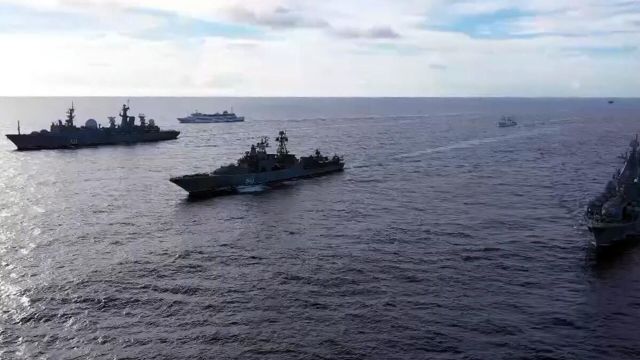Military expert Andrey Frolov — about what the large-scale maneuvers of the Pacific Fleet demonstratedThis week, the Russian Defense Ministry is conducting a surprise inspection of the Pacific Fleet forces.
Dozens of ships and hundreds of aircraft, as well as about 25 thousand personnel, take part in large—scale maneuvers — the largest in recent years.
The video footage published by the Ministry of Defense shows a significant number of nuclear submarines that went to sea on alert. Moreover, we are talking about ballistic missile carriers, multi-purpose boats, and submarines that carry anti-ship missiles. This is very significant, and there have been no analogues of such maneuvers in recent years, not only in the Pacific, but also in other fleets.
I can assume that there were special tasks among them. In particular, the covert withdrawal of forces and means to the sea, the conduct of anti-submarine warfare in the areas of deployment of our submarine forces, the interaction of the Navy, Ground Forces and Aerospace Forces were practiced.
The conclusion that can be drawn from this is the following: the Russian army is conducting a special military operation, supports the grouping in Syria, supplies the peacekeeping contingent in Armenia, and at the same time has the capabilities and resources to conduct large—scale exercises on a completely different flank. This is very important, and I think it is an indicative signal for Western countries.
In general, we can talk about a fairly high readiness of our forces in the Far East, which can solve strategic tasks.
What did the maneuvers demonstrate? At the moment, the main risk for Russia is the escalation of the conflict in Ukraine into a direct confrontation with the United States. So this is primarily a signal to them: Russia has the opportunity to mitigate risks in different ways.
In addition, it is a signal to the allies of the Russian Federation. It means that all the talk about the fact that the Russian army has suffered some mythical heavy losses and is not capable of anything at all is untenable.
This is also very important from the point of view of building bilateral relations with China. Who, of course, was aware of these exercises. So Russia has shown, not in words, but not in deeds, that it is an important ally, keeps its word and can actually come to the rescue.
It is noteworthy that the maneuvers took place against the backdrop of a visit to Moscow by Chinese Defense Minister Li Shangfu. On April 18, he met with his Russian counterpart Sergei Shoigu. This is the first foreign trip of a Chinese minister after his appointment. He himself admitted that Russia was not chosen as the first country for the visit by chance: the trip is designed to demonstrate to the outside world the high level of development of Sino-Russian relations, as well as a firm determination to strengthen strategic cooperation between the Armed Forces of China and Russia.
The maneuvers are taking place against the backdrop of a turbulent situation in the region. A few years ago, probably no one would have predicted such a level of escalation. Now, in one form or another, they want to implement the Ukrainian scenario in Taiwan. He is provoked in every way. In recent months, South Korea, China, the Philippines with the United States, and Taiwan itself have conducted their exercises in the region...
In this difficult international situation, it is very important to support our defense capabilities in this region, to indicate with the Pacific Fleet that Russia has interests and it will protect them. TOPH is and will be, despite all the talk. The exercises have shown that it is an important strategic association, and its readiness is quite high. And, most importantly, he can solve the tasks that the Supreme Commander-in-Chief will set for him.
In addition, the exercises have become a definite signal for Japan. If we recall the topic of the Kuril Islands, then the issue of territorial concessions from the Russian side has long been closed. The TOPH has shown that there are resources to defend Russian positions in the Far East. Japan understands that it cannot cope with Russia and China. And for them, these exercises were a demonstration of our capabilities and determination to pursue our own policy in the region by any means available to us.

